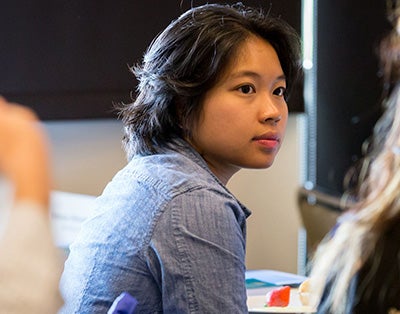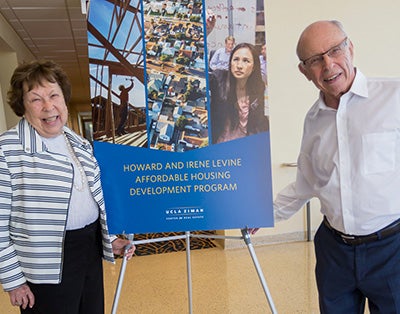The UCLA Ziman Center Pilots Change
The UCLA Ziman Center Pilots Change

UCLA Ziman LAHDP co-directors Joan Ling and Stuart Gabriel led the inaugural Howard and Irene Levine Affordable Housing Development Program in 2018
In 2018, UCLA Anderson's Ziman Center for Real Estate inaugurated the long-incubated Howard and Irene Levine Affordable Housing Development Program (LAHDP) specifically to impart interdisciplinary and highly specialized expertise to the next generation of affordable housing professionals — across institutions and sectors that include state and local governments, social enterprises and for-profit developers — so they can implement real solutions in the face of bureaucratic, logistical and financial impediments. The pilot program included almost exclusively entry-level professionals forging careers in affordable housing development, most from the Los Angeles region.
"Ziman Center programming of this nature already exists for Anderson MBA students," says Professor of Finance Stuart Gabriel, Arden Realty Chair and director of the Richard S. Ziman Center for Real Estate at UCLA. "LAHDP is unique as a university-level affordable housing training open to a wide cohort beyond students and academics."
Why this training, though, and why now?
- In L.A. alone, 58 percent of renters spend more than 30 percent of their income to meet housing costs
- Housing affordability has reached crisis levels nationwide, making it both a political problem and an economic problem
- Barriers to development are legion, requiring more and more specialized knowledge and capacity to navigate permitting, zoning and finance structuring
According to Gabriel, "It's time for industry as well as nonprofits to benefit from a broader knowledge of how to create affordable housing using a 100 percent vetted toolkit carefully designed by UCLA faculty and industry experts." LAHDP teaches young professionals to envision how traditionally siloed agencies and sectors can work in collaboration, not just in tandem, to cut through divisions.
"The private sector needs to know that money can be made in affordable housing," says Ziman Center executive director Tim Kawahara. "If the only housing starts are luxury, there will never be enough affordable housing. It cuts into the urban workforce if people can't afford to live where they work, putting in jeopardy our region's economic viability."
Gabriel's LAHDP co-director Joan Ling, lecturer in urban planning at the UCLA Luskin School of Public Affairs, declared on the first day of training, "Affordable housing development isn't rocket science. It needs two things, land and money. Since there isn't enough land, it's land use policy that needs expanding."
But, says Gabriel, "It's a difficult asset class to develop because the sources of capital are different. In metro areas, the available land is limited and challenged, and the specialized needs of populations increase costs."
The groundwork for LAHDP was laid through research, campus collaborations and outside partnerships. To develop the curriculum, Gabriel and Ling teamed with Professor of Architecture and Urban Design Dana Cuff, who is also director of cityLab; and Ziman Center board member Lance Bocarsly, a lecturer at UCLA School of Law and founding partner of Bocarsly Emden Cowan & Arndt LLP.

Vanesa Donangtavanh, a project technician at Self-Help Enterprises in Visalia, California, is applying her training to affordable rental housing solutions in the Central Valley
Industry instructors and mentors guided participants through lectures and lessons in tax codes and credits, entitlements, finance structuring and other crucial business angles specific to affordable housing developments. The program paired each team of six participants with a UCLA M.Arch. design consultant to develop a real housing tract in the Mar Vista neighborhood of Los Angeles. The assignment was based on extant zoning and permitting parameters. Teams were responsible for establishing a mission and targeting a specific tenant population, such as previously homeless military veterans or youth transitioning from foster care or some combination. Standard conundrums, like parking capacity, were negotiated alongside the more esoteric parameters of partner programs and funders.
Participants included those from organizations with an established record of affordable housing success, such as L.A.'s Skid Row Housing Trust and Mercy Housing California. Others came from smaller regional entities like the East L.A. Community Corporation, Coachella Valley Housing Coalition and Self-Help Enterprises in Visalia.
Dawn Hicks, the Enterprise Rose Architectural Fellow at Venice Community Housing, is applying the LAHDP training to a development of 34 permanent supportive housing units. It's a real-life example very similar to the case study she worked on with her Ziman team. "Renewal strategies of urban neighborhoods often create development plans that never seem to reflect or consciously include those who already reside there," she says.
UCLA Anderson alumnus Jarred Herman ('14) is construction manager for Los Angeles developer BW Brody Affiliated and is breaking into real estate as well. "Housing costs affect everybody," he says. "I want affordable housing to be a component of what I do. It makes sense to partner with a nonprofit to acquire funding and manage those projects on an ongoing basis."
The pilot program determined in part what the wider applicability of this training could be. "California is a prime example," says Gabriel, "but housing affordability is becoming a problem nationwide."
Longtime Ziman board member and UCLA Anderson Inspirational 100 alumnus Howard Levine ('67), whose commitment to housing and social responsibility dates back to his early business success, told participants on the first day of training, "We have a critical problem in L.A. Some 53,000 people in this region don't have a place to sleep. This is a great opportunity for you to support a new agenda for affordable housing and the homeless."

Benefactors Irene and Howard Levine champion public dialogue and education around the crises of homelessness and housing affordability
The Levines established the Howard and Irene Levine Program in Housing and Social Responsibility to serve the community by promoting public dialogue and education around the escalating crises of homelessness and housing affordability. Kawahara, on behalf of the LAHDP team, says, "We are grateful to Howard, Irene and the entire Levine family for sharing in our vision. Their philanthropy enabled the Ziman Center to offer this critically needed program."
The Ziman Center will continue to explore professional education opportunities around innovative housing solutions. "We know of no other major research university that's taken on this societal challenge in this way," says Gabriel. "We will grade ourselves on how successful we are in getting graduates of this training to develop affordable housing."